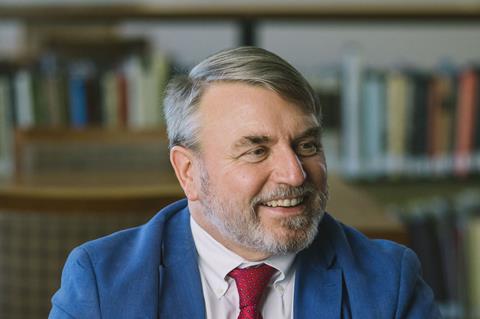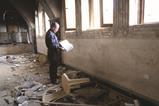A former member of the far right speaks out about the need for conversion to the love of Christ as the answer to the violence on our streets

Joseph Pearce spent ten years in the National Front, a far-right extremist organisation, which led to two prison sentences. He rejected this hatred in the late 1980s as he grew closer to Christ through the written work of Christian intellectuals such as CS Lewis and GK Chesterton.
Here, he explains how his heart was converted from racist hatred to the love of God, and how he thinks the Church should respond to violent extremism today.
What is your family background?
I was raised de jure Anglican, but de facto agnostic. We never said any prayers. We never went to church, [just] weddings and funerals.
I love my father dearly, and he was, in many ways, very, very good. My love for Shakespeare, I learned from him - but I also learned racism from him. He very much resented the changing face of Britain post world war two. He was born in 1930. So I was raised basically to resent immigration, and to make no bones about it, to be a racist.
I did not like people that were not white skinned, simple as that. So at the age of 15, I joined the National Front, which was a white supremacist British nationalist party.
What was it that drew you to Christ?
I was convinced at the time of my reception into the Catholic church, that my journey to conversion was entirely rational, but I realised later that there was something else going on. The supernatural, healing power of grace was working on me without my knowing it at the time.
I would not have read anything Christian. I was not interested. But I was obviously interested in politics and economics, and so I became interested in the political ideas of GK Chesterton and Hillaire Belloc. And I started reading Chesterton and Belloc, and found that although I disagreed with their religious perspective, I liked much else that they stood for, and I loved their writing style, their sense of humour and Chesterton’s use of paradox. I couldn’t help liking him. It’s like falling in love. You want to be with the person. So I became a Chesterton junkie, and then I discovered CS Lewis, and that was a whole new process.
Over a period of time, you realise that the reason that these writers held those political and economic positions, was because of a philosophical position. And the reason they held that was because they were Christians. In other words, all these things are derivatives, ultimately, from Christian theology.
And so once I came to realise that, instead of resisting the call to Christ, I began to respond. As Chesterton says somewhere: when people stop resisting Christ, they’re drawn towards him. And that’s exactly what happened with me.
How do you feel now about your former far-right beliefs?
I don’t want to tar everybody with the same brush, because that’s the problem these days, everybody is stereotyping everybody else, and not actually treating people as human persons. But there’s no doubt at all that I was a racist, and that most of my comrades were racists.
the hatred of one’s neighbour is a sin
I do want to distinguish between racism, which is basically treating your neighbour with contempt irrespective of the colour of their skin, which is a bad thing… and an opposition to unlimited immigration, because clearly there are all sorts of socio and economic problems that are associated with that, as well as cultural problems. I don’t think that having a ‘no limit’ approach to immigration is helpful to anybody. But there’s a big distinction between that and despising someone because of the colour of their skin. And I was certainly guilty of the latter when I was involved in the NF.
You’ve seen what’s been happening in the UK over the past week. How do you feel about the violence on the streets?
First of all, the hatred of one’s neighbour is a sin. The two great commandments of Christ, are love the Lord thy God and love thy neighbour. But that applies to militant Islamists, as much as it applies to these white radicals that were on the streets violently in Yorkshire and other places.
You can’t have social cohesion, ultimately without God
So the problem is hatred, and one of the problems we have is that we’ve excised Christianity from the public square, we are basically insisting upon a de facto radical relativism, where virtue is not talked about because virtue brings up questions of religion. And so people are being raised with no ethical compass, no ethical bearings, no orientation beyond, ultimately self gratification, where narcissism is the name of the game. Everybody’s going to want what they want. And that’s that’s a recipe for societal meltdown, and one manifestation is going to be different communities hating each other.
You can’t have social coherence or social cohesion, ultimately without God, and ultimately without faith. And what we’re seeing, I think, is the meltdown of the of the relativist society. So it saddens me, the violence sickens me, the violence which puts lives at risk sickens me particularly. But I’m not surprised. This is a meltdown that anybody with eyes in their head, wisdom in their heart, should have seen coming.
Can you apply your own experience and your own faith journey to what is happening today?
One thing that’s been very heart warming and edifying for me is that over the years, I have been in correspondence with former skinheads and Neo Nazis, often when they are in prison. Someone who is now serving a long prison sentence for Islamist violent terrorism has reached out to me, we’re having a correspondence too.
So I think that Christ, and particularly faith and reason, is a bridge that can actually heal individuals, first of all, but also heal communities and bring people together.
When it comes to the violence we’re seeing on the streets, what would you advise church leaders to do?
If the person who approaches the priest or the pastor is someone who’s angry and is sympathetic [with the violence], then reiterate that at the heart of the Christian life is caritas [love]. It’s love for neighbour.
Anger is an enemy. The only person who has the right to turn over the money changers table in the temple is Christ, because he can have anger without it leading to a lack of charity.
If we allow anger to fester in our hearts, we very quickly lose charity, and if you lose charity, you’re on the wrong side. This can happen within religion, even if you’re saying the right things, but if you’re saying them without without love, you’re on the wrong side.
I would also caution against taking a self righteous approach of ‘Islamic militants or white racist militants, are pariahs who should basically be shot’. I mean, there could be all sorts of reasons why people are screwed up, messed up. They could have been physically, sexually abused. We don’t know anything about their past. And again, our approach should be the same as that of Jesus. He turned nobody away. And so we have to somehow not just love our neighbour, which can be hard enough. We have to love our enemy, which is harder, but we are nonetheless commanded to do that.
Joseph Peace is now a full time writer and academic. For more information, see his memoir: Race with the Devil: My Journey from Racial Hatred to Rational Love (Saint Benedict Press)
Premier will be bringing together the Christian community to pray against the unrest. Tune in at 12.30pm daily as we cry out to God to ‘Heal our land’. Listen in at premier.plus, via DAB or ask Alexa/Google to “play Premier Christian Radio”





































3 Readers' comments